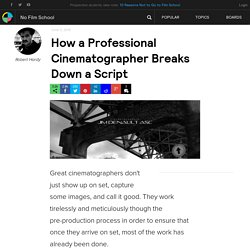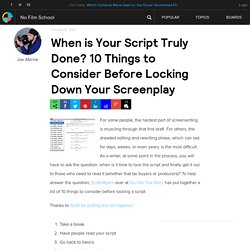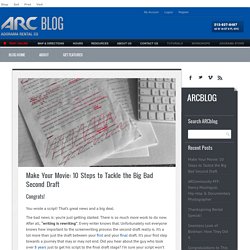

Write Quick & Better: The "Aha" Index Card Method. The Film Lab: A Screenwriter's Card Trick. How a Professional Cinematographer Breaks Down a Script. Great cinematographers don't just show up on set, capture some images, and call it good.

They work tirelessly and meticulously though the pre-production process in order to ensure that once they arrive on set, most of the work has already been done. While these processes are numerous and range from location scouting to building gear lists, one of the very first, and most critical, is breaking down the script. I've talked about script breakdowns for cinematographers in the past and outlined my own process. However, in an excellent little excerpt from his recent CreativeLive course about cinematography preparation, Jim Denault ASC shared his process for breaking down a script, and it's quite different from mine. This clip includes what he looks for both from an aesthetic point of view (i.e., sketching out how he wants these scenes to look and feel) as well as how to find technical and practical challenges that he and his team need to overcome. Let John August Show You How to Spruce Up Your Shabby Screenplay Step by Step. Every filmmaker knows that boring an audience means unequivocal failure.

And I'm not just talking about the audience sitting in seats watching your movie. Your film will have a number of different audiences at different stages of its development, but one in particular acts as the gatekeeper that will let your project begin its long and tiresome journey. I'm talking, of course, about the people that will read your script. When is Your Script Truly Done? 10 Things to Consider Before Locking Down Your Screenplay. For some people, the hardest part of screenwriting is muscling through that first draft.

For others, the dreaded editing and rewriting phase, which can last for days, weeks, or even years, is the most difficult. As a writer, at some point in the process, you will have to ask the question: when is it time to lock the script and finally get it out to those who need to read it (whether that be buyers or producers)? To help answer the question, Scott Myers over at Go Into The Story has put together a list of 10 things to consider before locking a script. Thanks to Scott for putting this list together: Take a breakHave people read your scriptGo back to basicsIs my script big enoughRead your script out loudDialogue due diligenceBe honest with yourself (Part 1)Be honest with yourself (Part 2)One final polishLet it go These have been the two most helpful in my own writing: 1.
Make Your Movie: 10 Steps to Tackle the Big Bad Second Draft. Congrats!

You wrote a script! That’s great news and a big deal. The bad news is: you’re just getting started. There is so much more work to do now. After all, “writing is rewriting”. Step 1. “When you’ve finished your first draft put it away in a drawer. Step 2. “A reasonable one. Step 3. “Make sure you’ve got an hour in which you won’t be interrupted. Step 4. Michael Wiese Books - Filmmaking Books. Want to Learn How to Write a Screenplay? This Slideshow Gives You a Great Crash Course. Writing a screenplay is one of the most challenging areas of filmmaking you'll ever undertake, which is why it's always nice to have a resource to guide you as you make your way through the wilderness.

Big Spaceship's Victor Pineiro provides a crash course on how to write a screenplay in an easy-to-follow slideshow, covering everything from how to flesh out your hero to the breakdown of the different units of measurement (beats, scenes, sequences, acts, etc.). Check it out below: There's really no right or wrong way to write a screenplay, but there are certainly ways to make the process a little easier if you're just starting out. It's by no means the be-all end-all structure in screenwriting, but again, if you're looking for something that will help get you through the complicated process, at least for the first go-around, this will most likely help you.
However, if you want to branch out and try different paradigms or even just make up your own, I'd certainly encourage that as well. Watch One of the Clearest, Most Helpful Explanations of Story Structure Ever. There are countless voices out there explaining various methods for unpacking your narrative.

Plot points, acts, and Hero's Journeys -- so many concepts. Which one do you choose? That's actually a bit of a trick question, because there's no one structural paradigm that wins out over the others. When it comes to screenwriting, rules and rigidity don't really translate well -- I suppose not even when it comes to structure. However, unless you're working on an avant-garde or experimental piece of cinema, having a clear structure is ideal in order to help your audience understand what's going on in your story.
How To Write A Short Film: Part 5 - 1 Minute Films. Let John August Show You How to Spruce Up Your Shabby Screenplay Step by Step. Star wars ring theory.